
The USA PATRIOT Act was a landmark Act of the United States Congress, signed into law by President George W. Bush. The formal name of the statute is the Uniting and Strengthening America by Providing Appropriate Tools Required to Intercept and Obstruct Terrorism Act of 2001, and the commonly used short name is a contrived acronym that is embedded in the name set forth in the statute.
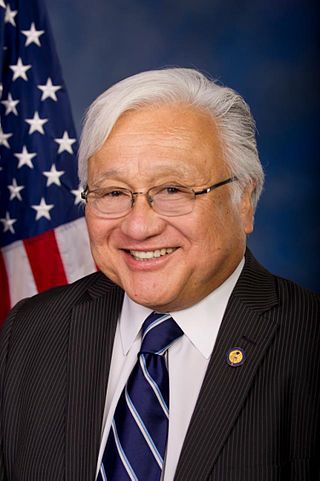
Michael Makoto Honda is an American politician and former educator. A member of the Democratic Party, he served in Congress from 2001 to 2017.
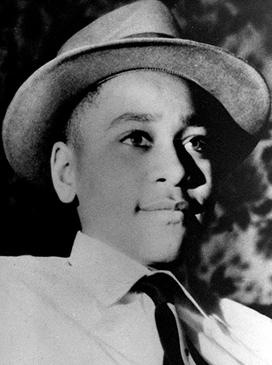
Emmett Louis Till was an African American boy who was abducted, tortured, and lynched in Mississippi in 1955 at the age of 14, after being accused of offending a white woman, Carolyn Bryant, in her family's grocery store. The brutality of his murder and the acquittal of his killers drew attention to the long history of violent persecution of African Americans in the United States. Till posthumously became an icon of the civil rights movement.

The Dyer Anti-Lynching Bill (1918) was first introduced in the 65th United States Congress by Representative Leonidas C. Dyer, a Republican from St. Louis, Missouri, in the United States House of Representatives as H.R. 11279 in order “to protect citizens of the United States against lynching in default of protection by the States.” It was intended to establish lynching as a federal crime. The Dyer Anti-Lynching Bill was re-introduced in subsequent sessions of United States Congress and passed, 230 to 119, by the House of Representatives on January 26, 1922, but its passage was halted in the United States Senate by a filibuster by Southern Democrats, who formed a powerful block. Southern Democrats justified their opposition to the bill by arguing that lynchings were a response to rapes and proclaiming that lynchings were an issue that should be left for states to deal with.
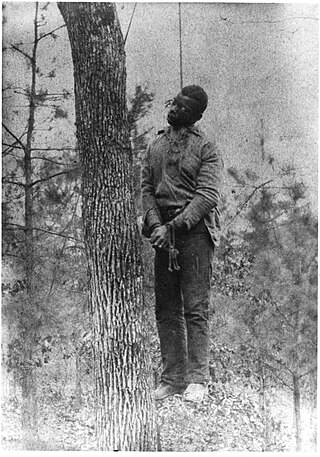
Lynching was the widespread occurrence of extrajudicial killings which began in the United States' pre–Civil War South in the 1830s and ended during the civil rights movement in the 1950s and 1960s. Although the victims of lynchings were members of various ethnicities, after roughly 4 million enslaved African Americans were emancipated, they became the primary targets of white Southerners. Lynchings in the U.S. reached their height from the 1890s to the 1920s, and they primarily victimized ethnic minorities. Most of the lynchings occurred in the American South, as the majority of African Americans lived there, but racially motivated lynchings also occurred in the Midwest and border states. In 1891, the largest single mass lynching in American history was perpetrated in New Orleans against Italian immigrants.

The Violence Against Women Act of 1994 (VAWA) is a United States federal law signed by President Bill Clinton on September 13, 1994. The Act provided $1.6 billion toward investigation and prosecution of violent crimes against women, imposed automatic and mandatory restitution on those convicted, and allowed civil redress when prosecutors chose to not prosecute cases. The Act also established the Office on Violence Against Women within the U.S. Department of Justice.
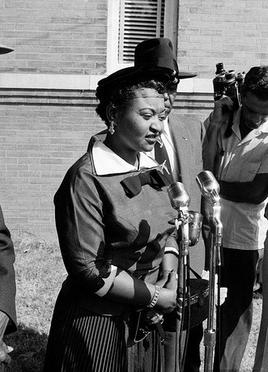
Mamie Elizabeth Till-Mobley was an American educator and activist. She was the mother of Emmett Till, the 14-year-old teenager murdered in Mississippi on August 28, 1955, after accusations that he had whistled at a Caucasian grocery store cashier named Carolyn Bryant. For Emmett's funeral in Chicago, Mamie Till insisted that the casket containing his body be left open, because, in her words, "I wanted the world to see what they did to my baby."

The Matthew Shepard and James Byrd Jr. Hate Crimes Prevention Act is a landmark United States federal law, passed on October 22, 2009, and signed into law by President Barack Obama on October 28, 2009, as a rider to the National Defense Authorization Act for 2010. Conceived as a response to the murders of Matthew Shepard and James Byrd Jr., both in 1998, the measure expands the 1969 United States federal hate-crime law to include crimes motivated by a victim's actual or perceived gender, sexual orientation, gender identity, or disability.
The Violent Radicalization and Homegrown Terrorism Prevention Act of 2007 was a bill sponsored by Rep. Jane Harman (D-CA) in the 110th United States Congress. Its stated purpose is to deal with "homegrown terrorism and violent radicalization" by establishing a national commission, establishing a center for study, and cooperating with other nations.

The Second Chance Act of 2007, titled "To reauthorize the grant program for reentry of offenders into the community in the Omnibus Crime Control and Safe Streets Act of 1968, to improve reentry planning and implementation, and for other purposes," was submitted to the House by Representative Danny Davis (D-IL) to amend the Omnibus Crime Control and Safe Streets Act of 1968 to reauthorize, rewrite, and expand provisions for adult and juvenile offender state and local reentry demonstration projects to provide expanded services to offenders and their families for reentry into society. H.R. 1593 was signed into law April 9, 2008.

The Debbie Smith Act of 2004 provides United States federal government grants to eligible states and units of local government to conduct DNA analyses of backlogged DNA samples collected from victims of crimes and criminal offenders. The Act expands the Combined DNA Index System (CODIS) and provides legal assistance to survivors of dating violence. Named after sexual assault survivor Debbie Smith, the Act was passed by the 108th Congress as part of larger legislation, the Justice for All Act of 2004, and signed into law by President George W. Bush on October 30, 2004. The Act amended the DNA Analysis Backlog Elimination Act of 2000, the DNA Identification Act of 1994, the Violence Against Women Act of 2000, and the Uniform Code of Military Justice. The Act was reauthorized in 2008, extending the availability of DNA backlog reduction program grants, DNA evidence training and education program grants, and sexual assault forensic exam program grants through fiscal year 2014.
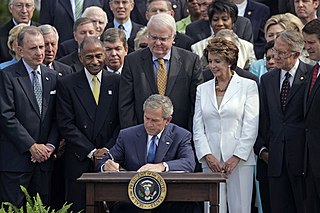
The U.S. Congress enacted major amendments to the Voting Rights Act of 1965 in 1970, 1975, 1982, 1992, and 2006. Each of these amendments coincided with an impending expiration of some of the Act's special provisions, which originally were set to expire by 1970. However, in recognition of the voting discrimination that continued despite the Act, Congress repeatedly amended the Act to reauthorize the special provisions.

The Justice for Victims of Trafficking Act of 2013 is a bill that would authorize the appropriation of $25 million annually over the 2015-2019 period for the United States Department of Justice (DOJ) to provide grants to states and other recipients aimed at improving the enforcement of laws against human trafficking and to assist victims of such crimes. According to newspaper The Hill, the bill would "impose an additional fine of $5,000 on any person convicted of crimes related to sex trafficking, sexual abuse, sexual exploitation of children or human smuggling."

The Justice for Victims of Trafficking Act of 2015 is an Act of Congress introduced in the Senate on January 13, 2015, and signed into law by United States President Barack Obama on May 29, 2015. It is also known as the JVTA. Broadly speaking, it aimed to increase services for survivors of human trafficking as well as to strengthen and empower law enforcement and first responders.

The Equality Act was a bill in the United States Congress, that, if passed, would amend the Civil Rights Act of 1964 to prohibit discrimination on the basis of sex, sexual orientation and gender identity in employment, housing, public accommodations, education, federally funded programs, credit, and jury service. The Supreme Court's June 2020 ruling in Bostock v. Clayton County protects gay and transgender people in matters of employment, but not in other respects. The Bostock ruling also covered the Altitude Express and Harris Funeral Homes cases.
Willie James Howard was a 15-year-old African-American living in Live Oak, Suwannee County, Florida. He was lynched for having given Christmas cards to all his co-workers at the Van Priest Dime Store, including Cynthia Goff, a white girl, followed by a letter to her on New Year's Day.

The Justice for Victims of Lynching Act of 2018 was a proposed bill to classify lynching a federal hate crime in the United States. The largely symbolic bill aimed to recognize and apologize for historical governmental failures to prevent lynching in the country.

The Emmett Till Antilynching Act is a United States federal law which defines lynching as a federal hate crime, increasing the maximum penalty to 30 years imprisonment for several hate crime offences.








